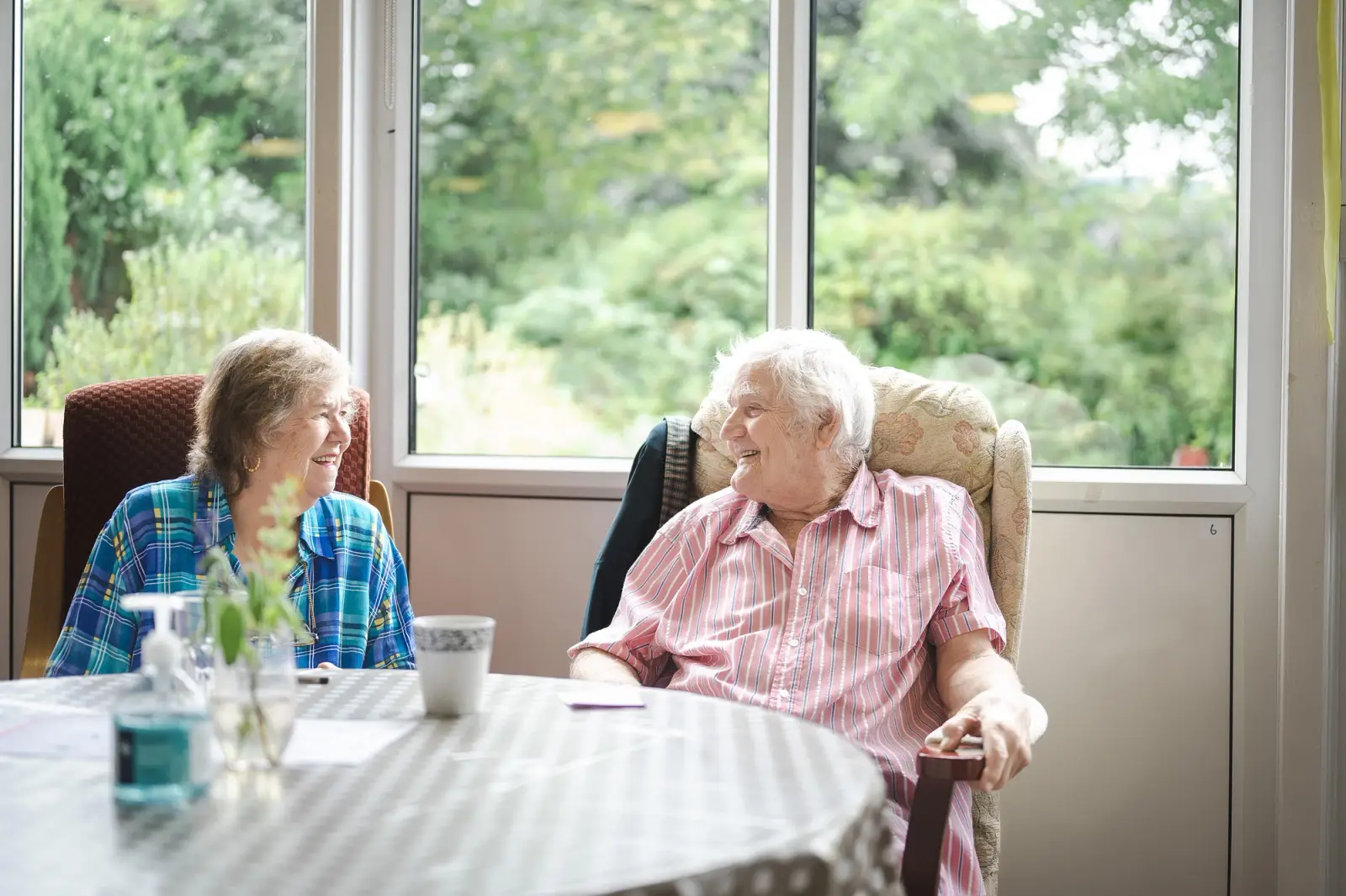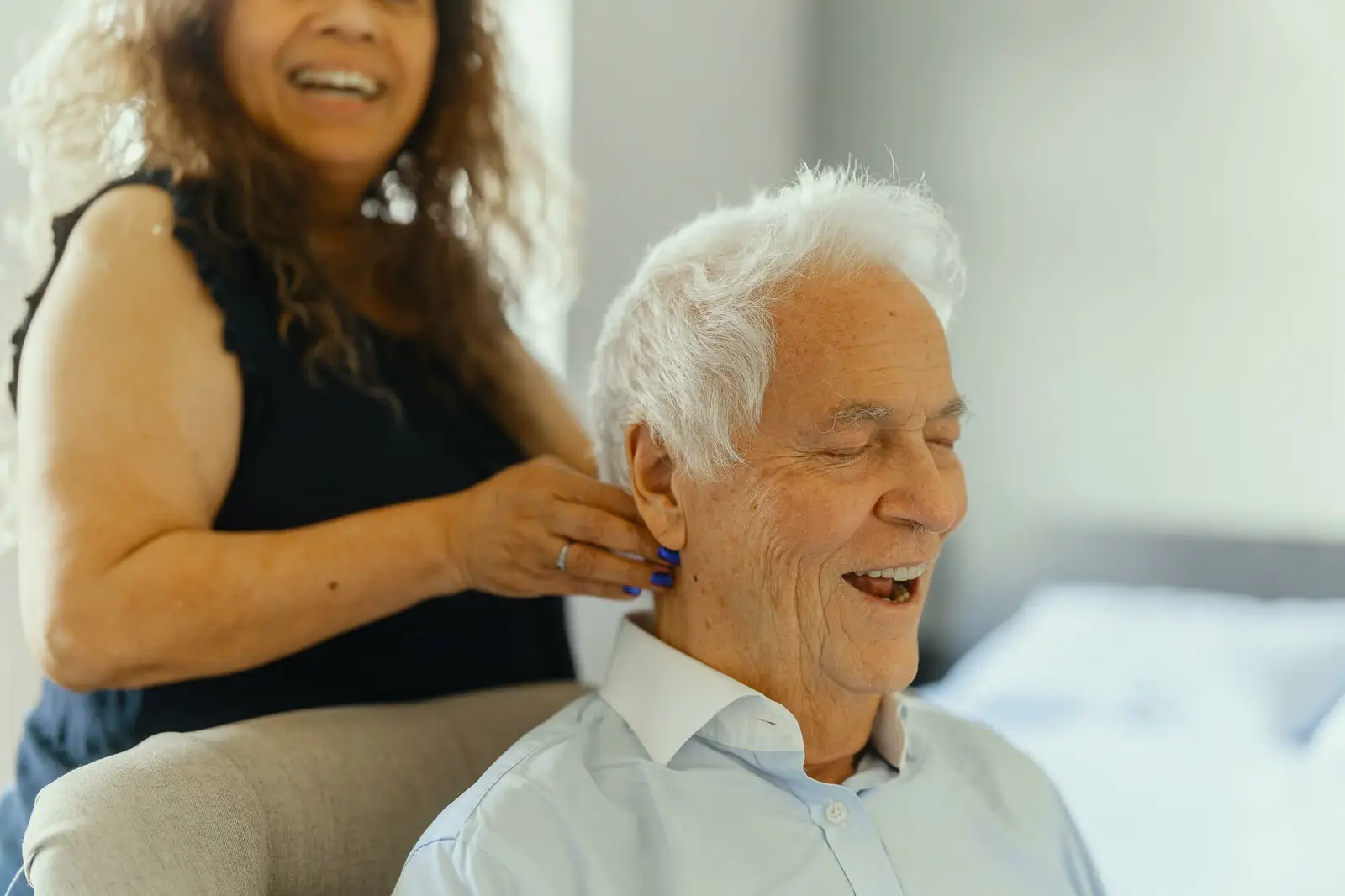What happens if a loved one refuses to move into a care home?
12-minute read | 25/10/2023

Editorial Contributor

Looking after an elderly loved one with specialist care needs can be a difficult time for any family, and one of the biggest problems you can face is when the person refuses help or is against moving into a care home. They may not accept that there’s a problem, or worry that they’ll lose control of their daily life. Whatever the reason it’s important to work with an older loved one towards a resolution, taking time to understand their concerns, and ensuring they’re involved in as much as possible in the decision-making process.
In this article, we’ll look at some of the reasons why an older person may refuse care – especially residential care, and offer some helpful tools and resources for exploring the best care options together.
Is your loved one resistant to moving into a care home? They’re not alone
Recent research has found that 72% of people over 75 years old reject the idea of moving into a care home. This is compared to 47% in 2014.
However, when looking at how older people feel about alternative types of care, 69% would also be against being cared for by their children.
Why are elderly people resistant to care?
For the older generation, being independent is a matter of pride. Many fear the loss of their independence because unfortunately, care does have a stigma attached to it. After being independent and capable for decades, it’s not easy to accept that you’re older and no longer able to cope on your own. The old trope of being moved into a care home against their wishes only adds to an older person’s worry that they’ll be ending their life in an institution surrounded by other elderly people, and lose social contact with their friends and family.
It's difficult living with people who can't say much.
— Quote from a care home resident in Pembrokeshire, interviewed by AgeUK
Leaving your own home can be a hugely emotional process. People spend years building a life – filling their homes with memories and special possessions, and forming relationships with people in their community. Having to say goodbye to all of this, adapt to a new routine, and downsize to fit into care home accommodation can be really upsetting. If they live with a partner, having to leave them behind can be distressing as well, and especially for people with dementia who may not fully understand what’s happening and why.
When it comes to the care itself, pride and dignity can again be a big factor. It can be really difficult to accept intimate personal care such as washing or help getting to the toilet from someone you don’t know. Even though care home staff are usually highly trained and naturally compassionate people the prospect of this can feel uncomfortable and intrusive for many. Outside of personal care, an older person may have deeper worries about the people who will be caring for them. What if they don’t like them or have anything to talk about? What if they treat them like a child, or don’t listen to them properly?
Dad loves his home, having his own things about him, doing the things he really enjoys. He lives in a small village and he loves to feel part of the community, to be able to see friends and neighbours is important.
— Elder customer Helen
Who decides when someone needs to go into a care home?
The decision should ideally be made by the person needing care and their family.
Sometimes a significant event such as a fall, accident, or complex illness may lead to a stay in the hospital. In these cases, medical professionals or social workers may assess that some form of care needs to be put in place before an older person leaves the hospital, to ensure their safety.
Some families may have started to notice smaller signs that a loved one is struggling with daily tasks and may no longer be safe at home. Things like letting their personal hygiene slip, increasing amounts of clutter and rubbish around the home, or a change in mood or behaviour may signal that extra help is needed.
It’s important to remember that we all have the right to decide how we want to live our lives – which includes how we’re cared for in later life. Involving the person needing care in the decision making process is really important. Whether you’re looking at going the private route of hiring a home carer yourself, or have had a needs assessment completed by social services and believe that a care home would be best – make sure you step into their shoes – ask how they feel, and what’s important to them, and put their wishes front and centre whenever possible.
Can a person with dementia make decisions about their care?
If they have the capacity to make rational decisions and voice their wishes, then yes. However, often by the time a person with dementia needs the level of care provided in a care home, they no longer have the mental capacity to do this for themselves.
If possible, making the decision early is really key. Older people can set their care wishes in an advance statement if they have the mental capacity to do so. This is a legal document that expresses, in writing, a person’s preferences for what their future will look like if the time comes when they can no longer voice these wishes or make decisions. It can include things like where they’d like to be cared for, what they’d like to eat, and the people they’d like to see.
If there is no advance statement, the decision will lie with their appointed health and welfare lasting power of attorney, or personal welfare deputy. You can find out more about these roles here.

How to approach the subject of care
It’s important to choose the right time to broach the subject of care. Choose a time when both you and your loved one are comfortable and have plenty of time – this is not a conversation that can be rushed, so pick your moment carefully.
It may be helpful to have other family members present, but be careful not to give the impression that you are ‘ganging up’ on them, or that the decision has already been made between you all.
You may find outlining all the things that your elderly loved one is still able to do at the start of the conversation sets a more positive outlook, rather than focusing on the negatives. Gently steer the discussion around to problems that your loved one may be experiencing, and give them time to talk openly and share how they view their current situation.
It’s very important that your elderly loved one should feel that their voice is heard and that their concerns are being listened to. Nobody likes to have all their decisions made for them, so approach the subject as sensitively as you possibly can.
Be prepared to spend time and trouble discussing all aspects of care with your loved one. Bear in mind that this is a difficult process for them to accommodate, and the suggestion of care may bring complex emotions to the surface. Don’t expect a resolution straight away, give everyone time to go away and process, and end each conversation with an agreement of when to discuss care again.
Care can be challenging to talk about. In this guide, Zoe Feldwick explains why it’s important not to put off difficult conversations and shares actionable steps you can take to encourage better conversations with your loved ones. Read her advice
Finding the right care home
If a care home is the best option for your loved one then it’s essential to understand that the services and accommodation can vary a lot between homes. The first step is to understand which type is suitable for their care needs –
Care home – provides personal care such as washing, toileting, and administering medications
Nursing home – provides the above care, but with additional nurse-led medical care such as administering regular injections and controlled drugs, stoma and catheter care, PEG feeding, and treating wounds. Some care homes will also offer nursing care services.
Alongside the health side of things, it’s important to look at the range of facilities to ensure the care home environment supports their quality of life. For example, a home with large gardens or an allotment can be a great fit for an avid gardener. If a person is keen to maintain or build an active social life you may want to look for somewhere that offers care home residents a calendar of events, activities and trips. This can include things like painting classes, visits from therapy animals, and days at the seaside.
Many care homes offer on-site amenities too such as nail salons, cafes, and cinemas.
Care home directory service Lottie also recommends considering looking at the following to help make an informed decision –
- Are staff welcoming and friendly? Assess whether they have a genuine interest in your loved one and their lifestyle. Ask if the manager is available and happy for a chat, and whether it’s possible to have a tour of the home.
- Are floors and surfaces clean? Take a look at soft and hard furnishings to check they’re in good condition.
- Is there a wide and varied menu on offer in the dining room and onsite cafe?
- Are residents interacting with each other? Do they look happy and well cared for?
- Can they provide you with a copy of their activities calendar so you and your loved one can see if there’s anything that interests them?
Mental health and care homes
Recent studies have estimated that 40% of care home residents experience low mood/depression. There are a number of reasons why mental health issues can be more prevalent in care homes, and a number of experts are working hard alongside care home managers to change this. Find out more here.
Consider different care options
Professional care doesn’t have to involve going into a residential home. It may be possible for family members, neighbours or volunteers to help out on a regular basis with housework, shopping, gardening and cooking for example. Organisations such as Age UK also offer paid services that can help with day-to-day domestic tasks.
Some families are able to adapt their homes to create a ‘Granny Flat’, which guarantees privacy, yet allows for assistance to be offered as and when needed. And many domiciliary care providers can offer regular visits from professional carers to help with personal care, cooking, and companionship. If you’re a family member looking after a loved one by yourself, you may want to look at local day centres. Here older people can visit a safe space for a few hours, get practical support and socialise.
However often if a care home is on the table then an older person is likely to need some form of 24-hour care. Round-the-clock care can still be provided at home too. Your local authority can arrange for an assessment to be carried out in your loved one’s own home, and this is a free service available to everyone. They will make suggestions for any home alterations which may be needed, such as stairlifts and handrails, and there may be grants available, depending on financial circumstances. They’ll be able to offer or help you arrange suitable alternative options too, such as live-in care, where a carer will move into an older person’s home, learn their routine, and offer support with daily living.
If your loved one is still unsure about having any form of professional care, it may help to arrange the type they have the least resistance to for a short period of time. Many at-home care providers and care homes offer respite care packages which can give an older person a week or two to experience life with care in place and see how it fits in with their lifestyle, as well as their expectations.
Live-in care in the home
At Elder, we carefully match self-employed live-in carers to those needing care by looking at care needs, lifestyle, and background. Having someone new in your home can feel like an intrusion at first, but when both parties have plenty in common, it can make the transition period much easier to cope with. Wherever possible, we try to ensure that caregivers and care recipients have hobbies and pastimes they share, along with a similar worldview, as this helps to foster a solid connection, which is important as the basis of excellent care.
Live-in carers can provide all sorts of services, from companion care and help with shopping trips to specialist dementia care. The carer lives with your loved one 24/7, so they are always on hand, available to prepare nutritious meals, get them safely to hospital appointments and facilitate stimulating days out.

Find your ideal carer
We have connected over 5000 families to carers so far.


